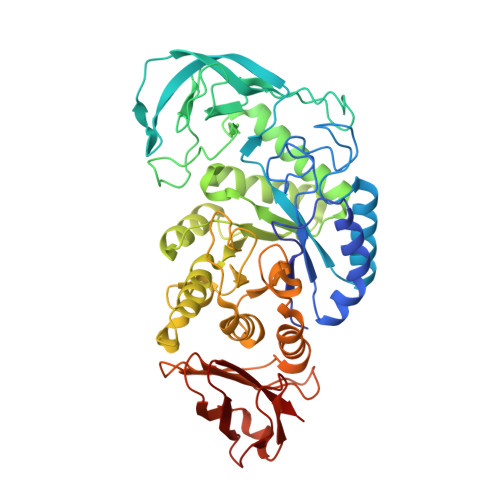Structure of Bacillus halmapalus alpha-amylase crystallized with and without the substrate analogue acarbose and maltose.
Lyhne-Iversen, L., Hobley, T.J., Kaasgaard, S.G., Harris, P.(2006) Acta Crystallogr Sect F Struct Biol Cryst Commun 62: 849-854
- PubMed: 16946462
- DOI: https://doi.org/10.1107/S174430910603096X
- Primary Citation of Related Structures:
2GJP, 2GJR - PubMed Abstract:
Recombinant Bacillus halmapalus alpha-amylase (BHA) was studied in two different crystal forms. The first crystal form was obtained by crystallization of BHA at room temperature in the presence of acarbose and maltose; data were collected at cryogenic temperature to a resolution of 1.9 A. It was found that the crystal belonged to space group P2(1)2(1)2(1), with unit-cell parameters a = 47.0, b = 73.5, c = 151.1 A. A maltose molecule was observed and found to bind to BHA and previous reports of the binding of a nonasaccharide were confirmed. The second crystal form was obtained by pH-induced crystallization of BHA in a MES-HEPES-boric acid buffer (MHB buffer) at 303 K; the solubility of BHA in MHB has a retrograde temperature dependency and crystallization of BHA was only possible by raising the temperature to at least 298 K. Data were collected at cryogenic temperature to a resolution of 2.0 A. The crystal belonged to space group P2(1)2(1)2(1), with unit-cell parameters a = 38.6, b = 59.0, c = 209.8 A. The structure was solved using molecular replacement. The maltose-binding site is described and the two structures are compared. No significant changes were seen in the structure upon binding of the substrates.
- Department of Chemistry, Technical University of Denmark, Building 207, DK-2800 Kgs. Lyngby, Denmark.
Organizational Affiliation:





















